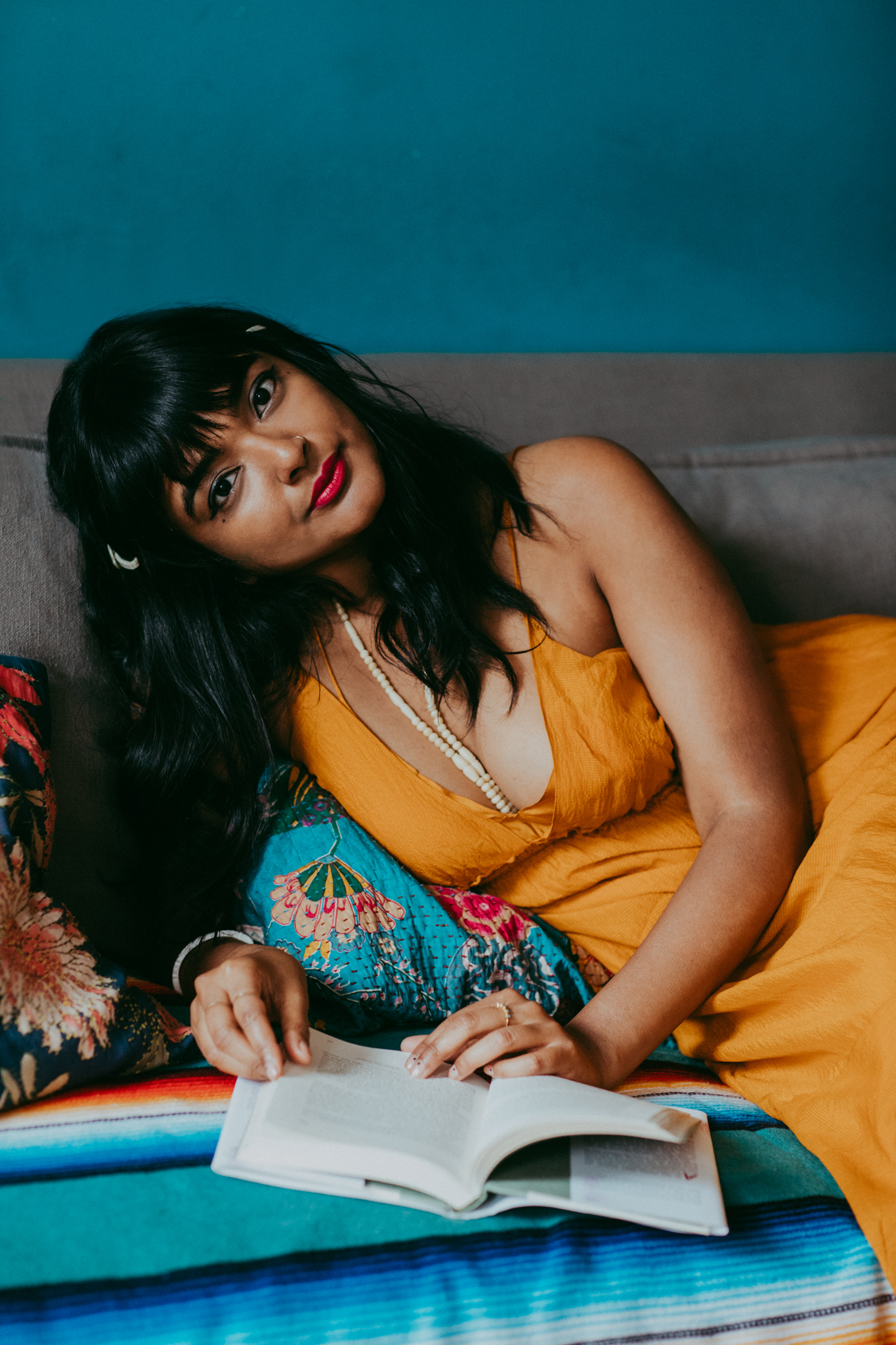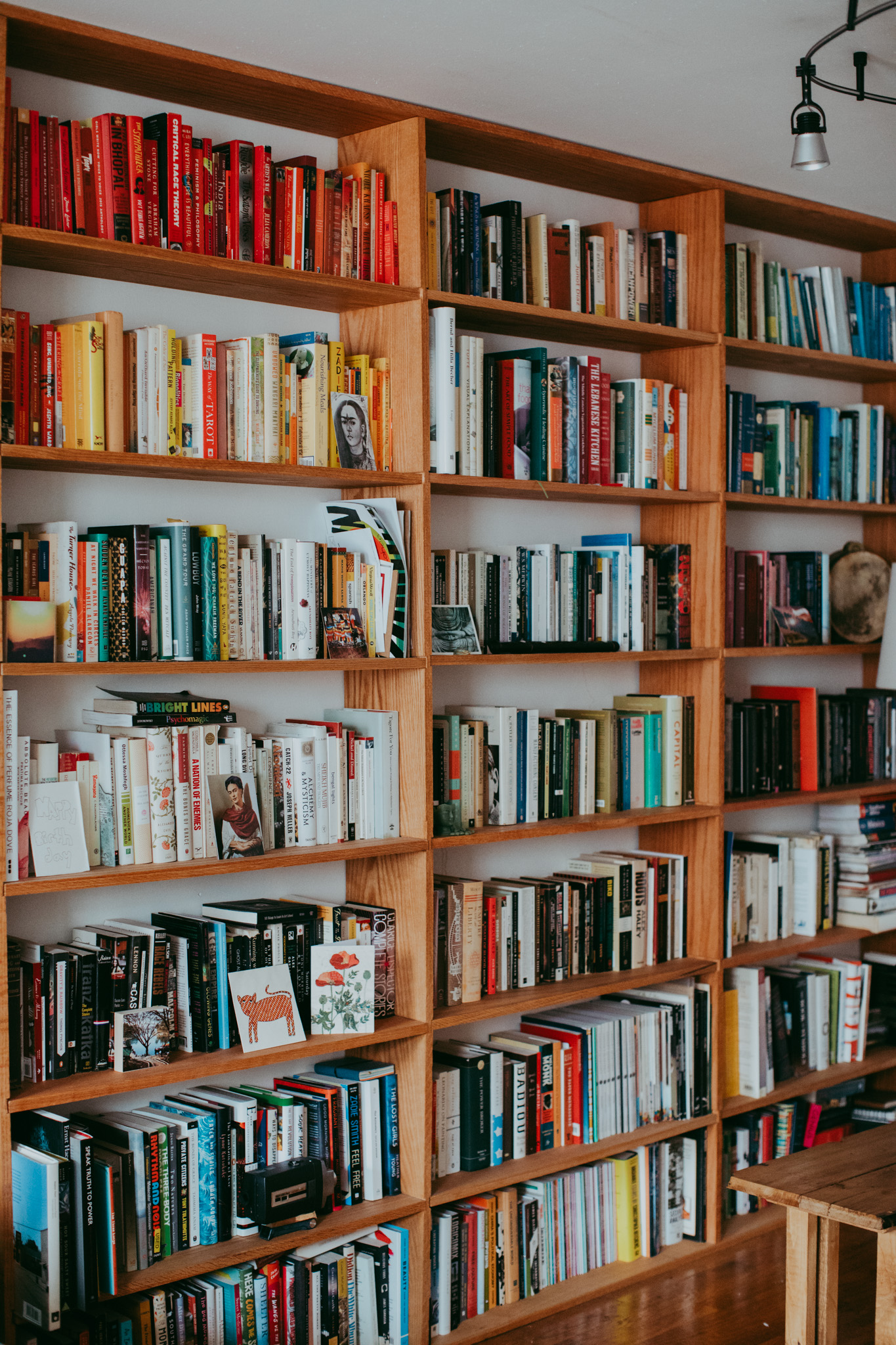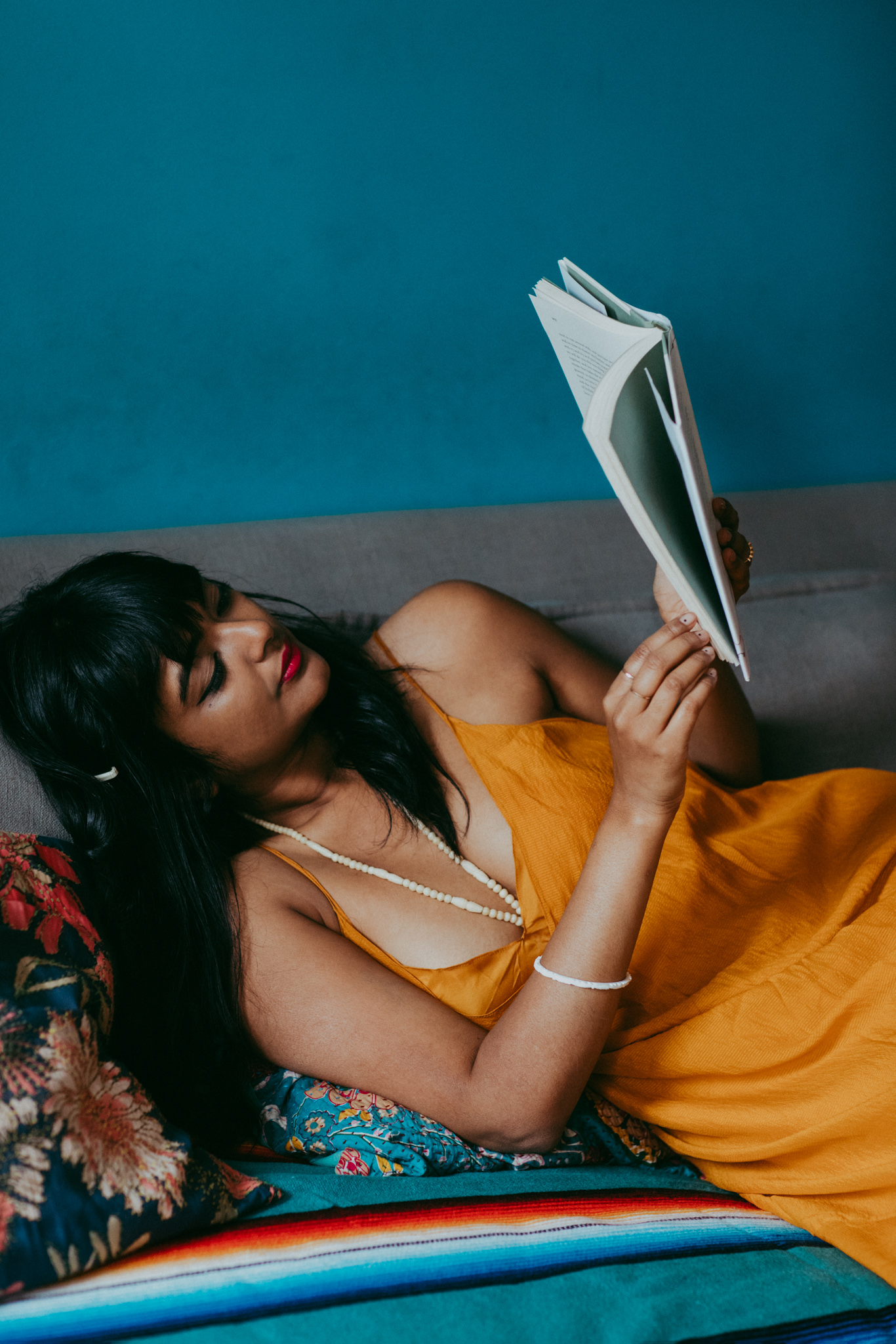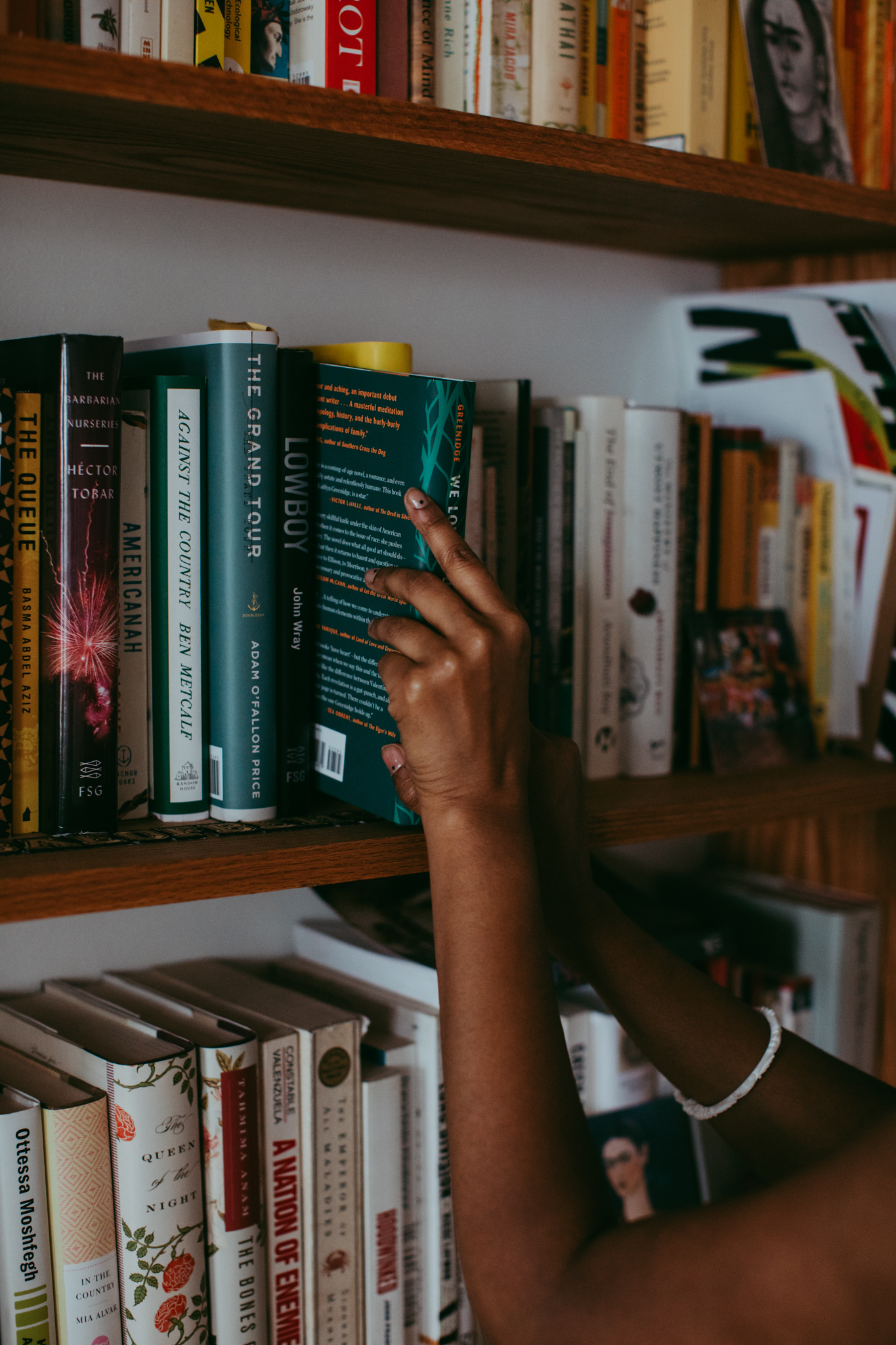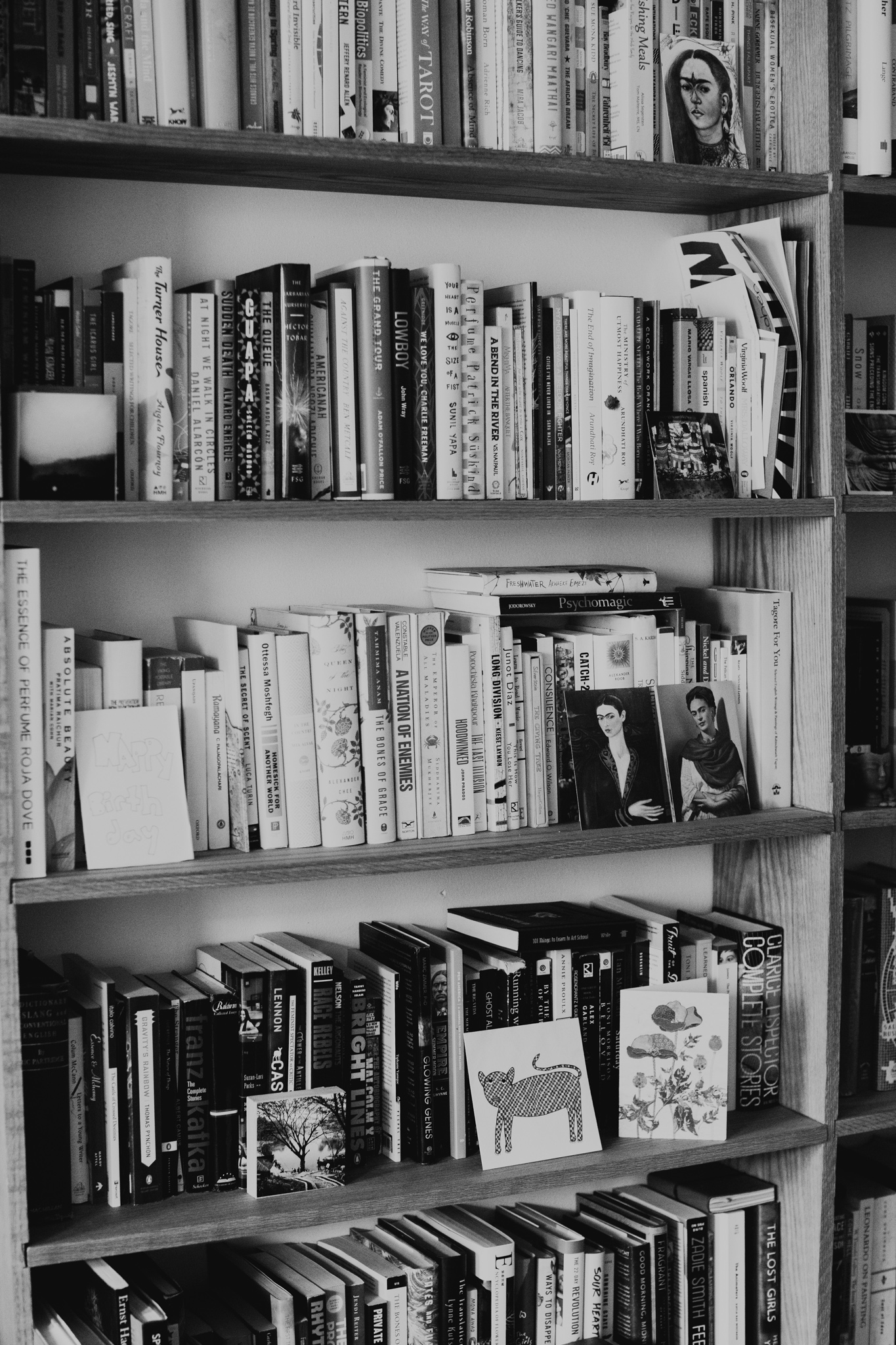
TANAÏS
TANAÏS (aka Tanwi Nandini Islam) is a Bangladeshi American author and beauty company owner living in New York City. Her first novel, Bright Lines, was a finalist for the Center for Fiction New Novel Prize, the Brooklyn Eagles Literary Prize, and the Edmund White Debut Fiction Award. She lives in Brooklyn and is working on a new novel. GAL interviews TANAÏS about her book preferences and writing process– but also how and why she started her company HiWildflower.
Read on!
Photography by Sylvie Rosokoff
Girls at Library: I'd like to start off by asking my favorite question: what is the power of story?
TANAÏS: I think that story is part of our consciousness building as human beings. It is an intrinsic part of who we are from the beginning of our humanity. When we write stories, we put on the page the multitudinous experiences of humanity. I have giant bookshelves in my house, and any time I'm feeling stuck and alone, I look at how each of these authors has tried to chip away either through fiction or science or religion or essays about their personal exploration of life to tell the story of what it was to be on this earth at the time that they were. I think that what keeps me going is just to know that I'm one sliver of an entire body of humanity's work to illuminate our experience.
GAL: Are there any particular books that seem to resonate more deeply with you than usual?
T: I'm reading a lot of books by women and queer and trans people of color now. Some of the books that I've read that have really just kept me inspired and motivated. I loved Her Body and Other Parties by Carmen Maria Machado and Akwaeke Emezi's Freshwater. I recently started reading this book called The Bliss of Inner Fire, too. It's a book about Tibetan philosophies of Tantra. I’m really interested to keep my reading list very open, to discover whatever inspiration from these people I can in terms of their style and inventiveness, but also what people are saying right now in this extremely feminist, open world that we're building.
GAL: Have you always been a reader?
T: Oh, yes. I think that is the first consciousness a writer has is I love to read, I love to devour books. I can do this; I want to do this. I think the process of becoming a writer is that you have to be a voracious reader.
GAL: Did you go to a library when you were a kid? Do you still go to a library?
T: Yeah. My family was not well-off at all while I grew up. My dad was an adjunct professor, and my mom worked in a grocery store when I was very young. Part of the way that my parents tried to imbue in us the feeling of fullness, which sometimes you might feel you're lacking if you don't have the right clothes, or you live in an apartment that's really humble and embarrassing, was to read and go to the library. I felt all this class shame growing up, so the library really represented a totally free space where I could read whatever books I wanted. I could check out as many books as I wanted, there is no limit, there's no number attached to it because it was free. My father would take me when I was young. That was one of the most wonderful ways I bonded with him, especially because he's such a reader and a writer. It made the world and different experience seem more possible.
GAL: So do you remember the first book that you fell in love with that turned you into a lifelong reader?
T: When I was really young, I loved that book A Chair for My Mother.
GAL: Oh my God! It's still one of my absolute favorite children's books. What drew you to it?
T: I get chills thinking about that book. It's like- what a great kid! If I had a kid...I'm not having kids, but if I did have a kid, I'd want that kid to be my kid 'cause she's such a good kid. I loved all things about it 'cause I related to the story so much. I remember the first time my family and I went to Bangladesh, we had to save every penny. We literally had a specific jar for saving up to pay for the trip. My parents hadn't been back in ages. We went back in 1992, and we hadn't been back in seven, eight years. For them, and for most people from the developing world, our tickets are $1,000, meaning that it’s nearly impossible to afford that flight. It's like the more far away you live and the more poor your country is, the more fucking money you have to pay for that. So I just really loved that book because I had a saving mentality when I was young. That book describes that kind of frugality and care. Plus, I loved the flowers and the colors. As I got older, I loved creepy books like Daughters of Eve, and V.C. Andrews, and Stephen King. Things that let me think about sex and death and murder.
GAL: Stephen King’s books were all about sexuality when I first read them around late middle school age. Did you feel similarly?
T: Yeah, and I liked that about them. My parents are Muslim, and I grew up in a Muslim household, and they never restricted what we read. I don't even think they realized what I was reading! Although they did see the cover of It and thought it looked like the scariest book cover ever, and, asked me "Are you sure you're not getting nightmares reading that?"
GAL: (laughs) Did you?
T: I think horror is such a specific genre that brings up the uncanny feeling of, “This is reality, but there's something very scary about this reality,” which really captivates me. I love playing with the idea that what is in front of us is not really quite what's in front of us.
GAL: What is your writing process like? Does horror influence you? You published Bright Lines in 2015, right?
T: Yes. I've been working on my new book since 2011. I'm very slow. I probably think about a book for five years before I feel brave enough to write it. I'm exploring artificial intelligence in this book, and I'm exploring the relationship between a mother and daughter vis-a-vis artificial consciousness and a human being interacting. New concepts that are becoming more and more a part of our reality as we move into the future which sometimes take a little more time to think about and research.
GAL: What do you love about being a writer? Is that timeframe frustrating? Do you ever feel like you’re stuck in a vacuum?
T: I love writing because it’s not so much about being young and knowing what's up. Wisdom is accrued over time. I think that is the path for some people, but for me it's more about how can I acquire the wisdom and knowledge to do justice for this story that I'm trying to write and build the most complex, rich milieu of characters because that's what I write about in the world that we live in. I don't think it's a vacuum in my way that I conceptualize it. I think, for me, I live in this world as a person who is always fighting to be heard and be seen, and my humanity is not a guarantee, my life is not a guarantee, my freedom is not a guarantee. I think that very few people of color feel that they automatically have a space to create, or there's so much imposter syndrome that we all face. But if you feel oppressed in any way, you also feel that so much more amplified. I definitely don't create in a vacuum, but I create in a space that's free of other people telling me what I need to say. I create from an experiential place of this is my body and experience in this world, and I'm going to fucking write about it
GAL: How often do you read? Every day?
T: No. When I need to read a book, I feel like I need to give myself hours and hours on my couch reading it. I need to devour it. I don't have every hour of the day to do that, so usually when I read, it'll be something at night, and not always fiction. If I read fiction, it'll definitely be the weekend is for this book. And when I'm writing, I do need to take breaks from reading because sometimes you just need to be in your silence, in your own mind.
GAL: Besides being an author, you own a beauty, perfume, and candle company. What led you to start HiWildflower?
T: Unemployment.
GAL: It's just so gorgeous.
T: Thank you.
GAL: I'm in love with everything on your website. The packaging, the perfume names, the scent notes themselves.
T: I love that you're in love with everything. I have always wanted to have a business, because seeing my parents struggle, especially working for people where you encounter racism and sexism daily was really tough to witness. Our last name is Islam. Before I moved to New York I lived in Missouri, and Alabama, and Texas, so it's definitely undoing some of the shame of my struggle as a person whose parents were trying to make it in this country. I've always seen a business as a liberating thing where ... I literally tweeted this the other day ... where I'm just like, I have a business so that I can sit and think and write and make money all at the same time. It started with four perfumes, and a couple of beauty and skin care products, and then grew from there.
“It’s really liberating and also scary to own your own business”
GAL: Where did you first start selling it? How did you get it off the ground?
T: It became a thing I did and sold at markets, and then I was in a few local stores in Brooklyn. Now we're in about 100 stores, and we're still growing. It’s really exciting to see how that happened, but it's because of so many experiences of rejection and failure that kind of gave me that fire to like go for it.
GAL: We want to hear about that fire. Tell us about it.
T: It’s really liberating and also scary to own your own business, but I think there’s also this part of us as artists that think something is too precious and beautiful to sully with money, and I don't want to degrade myself by making it partly about money. And then I'm like, “wait, what?!”
GAL: Okay, you want to know my secret phrase? It’s called cashing in, not selling out. Money buys independence in this world. You’re cashing in.
T: Yeah. Yes. Exactly, exactly. Do this to feel liberated, completely liberated in this world that we live in.
GAL: What of your line is your absolute favorite perfume right now? Does it have a particular story?
T: No, I don't have one favorite. I think that I'll just tell you what I'm wearing.
GAL: That works!
T: Right now, I'm really into Mala, which is the one that's inspired by New Delhi, and I lived in New Delhi for a year, and part of that experience was just really being inundated with the olfactory experience of being in India. I mean there's so much of India that's in America, and it's pretty oppressive to find these white western obsessions with India, like I have to experience it too, so being there, I was like "How do I encapsulate the scent of like a fresh garland, and incense together?" So to me, like, when I want to have that sultry, buzzy, summer scent, where you hug me and you feel like you're in a New Delhi shop, that's the scent that I'm wearing right now. So it's called Mala. And I wear, well the rollerball is sold out, but I have the spray, and that's the one I wear. An alcohol based perfume is more volatile, and it evaporates and other people can smell you. So that's like kind of my like, very showy and smelly foundation.
GAL: Speaking of favorites, or current favorites, do you have a favorite author?
T: Yeah, so, I think this is where it's harder for me to name favorites, because I do feel such a connection to different kinds of books. But I think like, for me, I absolutely, I'm looking at my bookshelf right now. I think some of my favorite authors would have to be, God, it's so hard to pick faves. Closest to my ultimate person I bow down to is Toni Morrison. I’m sure everyone says that but it’s true. I bow down to Toni, and I have a signed copy of Song of Solomon that's literally been my talisman of the greatness of American literature. I have her signature on the inside that says, "Regards, Toni Morrison." And that means I can do my job. I can do this. And then I mean, I love, honestly, it's like being a writer, and I'm friends with really talented people, like Kaitlyn Greenidge, Mira Jacob, Jenny Zhang, I mean these are all authors of our time, right now, who are writing amazing works. I'm into Tarfia Faizullah, Ocean Vuong, Safiya Sinclair. These are poets, but fiction and poetry, for anyone to write fiction, you've got to be checked into poetry, because what people are inventing and doing with the line, and exalting the line, it helps us be better writers.
GAL: Is it important for you to hold a physical book or can you read on a device?
T: No, no. I'm analog all the way. Everything I do, writing, and even perfume and candles, are about being inside your actual experience in your body. So, the art of the cover and the face of the author, it's all an important part of the experience. I need to feel very, very in my book. The books that I have on my kindle are things like the I Ching and How to Lose Weight in 30 Days, or whatever.
GAL: If you were to write your memoir, what would you title it?
T: Meditations of a Deviant Daughter.
GAL: Do you read memoir? Or biography?
T: Roxane Gay is doing amazing things with memoir. But generally memoir not where I'm at right now with the books I’m reading. I think when I'm a little bit older I'll be more inclined to enter in that space but I am deep into my fictive world right now. So I like to imbue that with a certain level of honesty. But I'm excited about Esmé Weijun Wang's memoir called The Collected Schizophrenias: Essays and Porochista Khakpour’s memoir titled Sick. They delve into really important issues of writing and illness, and being caught in this web of different political and timely things. The medical industrial complex and how each person is dealing with your their journey as a writer are things I'm interested in reading about.
“I feel empowered dipping into the minds of women and queer and trans writers,
because that has been completely invisible in human history.”
GAL: I was reading something in The New York Times the other day which I completely disagree with, and that the media keeps parroting all over the place. Do you feel desensitized at all to what is going on in the world? Especially in the United States?
T: I’m heartbroken and enraged by the kidnappings of children at the US - Mexico border. This inhumanity is being euphemized as “family separation” - I had a period of needing a break from the news cycle but this is violence with longstanding, devastating consequences and it woke me up and incit d me. I’ve been reading everything I can to keep up with what is happening and plan on marching on June 30 as cities across the country protest Trump and his vile and racist contempt for human beings. We can’t afford to be silent or asleep. Fiction is where I seek to reimagine our world; and the struggle lies within finding the solitude to work and fighting for our collective liberation.
GAL: How does it empower women to read other women's work?
T: These are like things I think about, but I don't know that I have the answers to it. I just think that for so long in human history, the minds of women have been rejected, silenced, brutalized, murdered, and just completely snuffed out of history. So for most of human history, the things that we know are all attributed to men, and it's impossible to me, as a woman with a mind, to think that a woman wasn't having the same thoughts that Galileo was having. That a woman was not having the same thoughts that Copernicus was having or Newton was having. That is not feasible. The amount that I have to fight for just my voice to be heard, I can only imagine what eons of women have gone through to be heard.
GAL: Do you look to any female writers in particular?
T: The women that I look to are often ancient poets of the past, like this South Asian poet, Mahādēviyakka, who walked around naked talking about how she loved god. I'm not into god in the way that she's into god, but I'm definitely into her walking around naked, being a poet, being like "I'm touched by god.” I feel empowered dipping into the minds of women and queer and trans writers, because that has been completely invisible in human history. To the point where it's a sick disease hurting us all. Like patriarchy is an illness. It's more than an illness, it's a structural and systemic oppression that we're all facing, but it's so ingrained in us that people feel that they're more valuable because they're light skinned. I mean, what? I want to read anyone who's fighting that on a basic level through their work. In terms of like how brilliant their mind is, how sharp they are, what they're looking at the world with. I want every women who are doing that, I'm just like "Hell yeah. I've been waiting for this".
GAL: Does New York City feel like home to you?
T: Oh yeah. I used to live in St. Louis when I was very young, about nine years old, and I remember watching “Where in the World is Carmen Sandiego?” and telling myself that I would pick New York if I won that show. And then a year later, I moved to New York, and I was on “Where in the World is Carmen Sandiego?”. I was on that show.
GAL: WHAT!!!!!!!!
T: Yeah, man, I was on that show. I was so excited. I didn't win because I didn't put the things in the right order, and the white boy who was my classmate got them in the right order and won.
GAL: No!! I wish you had won. Can we re-write history please? That was one of my favorite shows too. I watched it everyday.
T: I know! It’s pretty crazy. I have to write about it at some point. So, I always knew New York was my home. I always knew I was destined to be around this queer, colorful, eclectic city. I visited when I was at a young age, and I knew in my body that New York is where I would go. It’s where I would live. So New York has been my home before I even knew it was my home. I knew I would be here. I have property here. I'm gonna live here, I'm gonna be in New York and see the city through it's changes. And not leave, you know?
GAL: It’s a remarkable place to live. For our very last question,
would you please recommend three books every GAL must read?
T: Yes.
Her Body and Other Parties by Carmen Maria Machado
Electric prose, sensuality, queer, haunted.
Freshwater by Akwaeke Emezi
She has a dazzling voice. It’s otherworldly, ancient.
Exit West by Mohsin Hamid
It’s meditative, political and provocative with gorgeous prose.
Visit HiWildflower & keep up with them through Instagram.
Don't forget to pick up your copy of Bright Lines today!
Featured Books
More Like This






